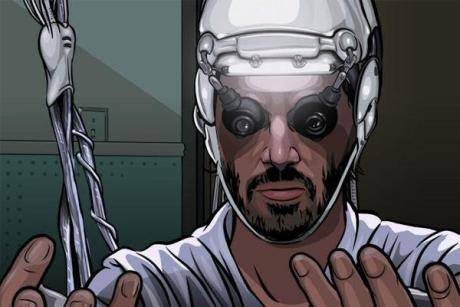Richard Linklater's A Scanner Darkly holds the distinction of being both the most faithful adaptation of a Philip K. Dick novel for the screen (calm down Blade Runner cultists, Ridley Scott took many liberties with Do Androids Dream of Electric Sheep?) and the last strong film Keanu Reeves held down the lead in.
Inspired by the brilliant science fiction author's own experiences as an amphetamine addict heading up a flop house, the story of an undercover narcotics officer suffering identity confusion due to drug use is among Dick's most personal. Having displayed an affectionate fascinating with the personalities imbedded in casual drug culture in his classic coming-of-age stoner movie, Dazed and Confused, and a preoccupation with the nature of reality with the often pretentious musings of Waking Life, Linklater was a sensible fit for the more mature take on both subjects required by Darkly's dystopian paranoia.
In a stellar example of smart casting, Reeves plays the burnt out narc losing touch with reality, Bob Arctor. His spaced-out laconic drawl is perfect for a professional mind slowly succumbing to the junky lifestyle.
Fitting that pattern of matching appropriate personalities to characters, Linklater tailored the roles of the wastrels Arctor is investigating to fit Robert Downey Jr., Woody Harrelson, Rory Cochrane and Winona Ryder. As a result, the cast was able to focus on developing an easy, familiar rapport between the drugged-out players more than worrying about adapting to foreign personas.
Using the rotoscope animation technique he first employed in Waking Life was an effective aesthetic choice by Linklater (and one more practical than novel this time), aiding the disorienting feeling of detachment and sense of permeable reality induced by the persistent use of Substance D, the hallucinogenic drug at the core of the epidemic that helped the war on drugs push this near-future America into an authoritarian foetal-Orwellian landscape.
Further infusing the picture with an air of bleak paranoia mixed with an uncommon degree of warm compassion for self-destructive and intentionally alienated waste cases is the warped acoustics of Graham Reynolds's score and the judicious use of a few of Radiohead's more abstract sonic morsels.
Equally sad, funny and fascinating, A Scanner Darkly is the kind of thoughtful and emotionally resonant science fiction that deserves to be rediscovered, despite a few unnecessary doses of heavy-handed political preaching that Linklater can't resist injecting.
A Scanner Darkly screens at the TIFF Bell Lightbox as part of the Whoa: The Films of Keanu Reeves retrospective at 9:30pm on April 5th, 2013. It will be preceded by a recorded introduction with Keanu himself.
(Warner)Inspired by the brilliant science fiction author's own experiences as an amphetamine addict heading up a flop house, the story of an undercover narcotics officer suffering identity confusion due to drug use is among Dick's most personal. Having displayed an affectionate fascinating with the personalities imbedded in casual drug culture in his classic coming-of-age stoner movie, Dazed and Confused, and a preoccupation with the nature of reality with the often pretentious musings of Waking Life, Linklater was a sensible fit for the more mature take on both subjects required by Darkly's dystopian paranoia.
In a stellar example of smart casting, Reeves plays the burnt out narc losing touch with reality, Bob Arctor. His spaced-out laconic drawl is perfect for a professional mind slowly succumbing to the junky lifestyle.
Fitting that pattern of matching appropriate personalities to characters, Linklater tailored the roles of the wastrels Arctor is investigating to fit Robert Downey Jr., Woody Harrelson, Rory Cochrane and Winona Ryder. As a result, the cast was able to focus on developing an easy, familiar rapport between the drugged-out players more than worrying about adapting to foreign personas.
Using the rotoscope animation technique he first employed in Waking Life was an effective aesthetic choice by Linklater (and one more practical than novel this time), aiding the disorienting feeling of detachment and sense of permeable reality induced by the persistent use of Substance D, the hallucinogenic drug at the core of the epidemic that helped the war on drugs push this near-future America into an authoritarian foetal-Orwellian landscape.
Further infusing the picture with an air of bleak paranoia mixed with an uncommon degree of warm compassion for self-destructive and intentionally alienated waste cases is the warped acoustics of Graham Reynolds's score and the judicious use of a few of Radiohead's more abstract sonic morsels.
Equally sad, funny and fascinating, A Scanner Darkly is the kind of thoughtful and emotionally resonant science fiction that deserves to be rediscovered, despite a few unnecessary doses of heavy-handed political preaching that Linklater can't resist injecting.
A Scanner Darkly screens at the TIFF Bell Lightbox as part of the Whoa: The Films of Keanu Reeves retrospective at 9:30pm on April 5th, 2013. It will be preceded by a recorded introduction with Keanu himself.
